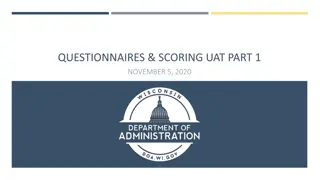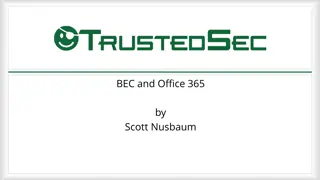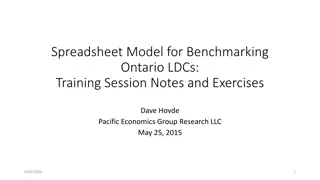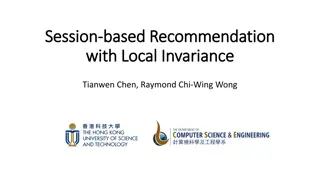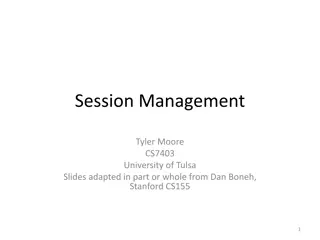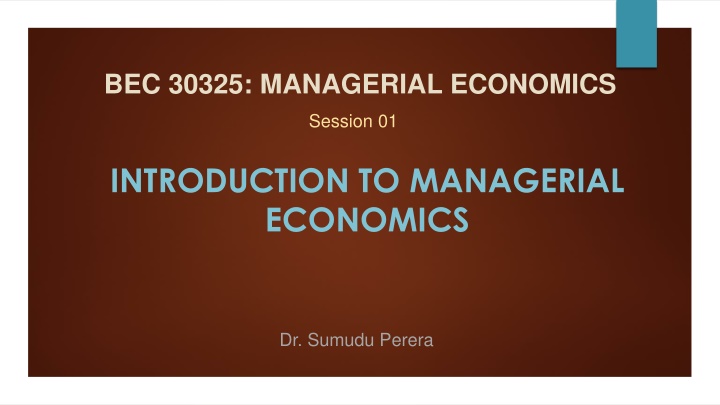
Managerial Economics: A Comprehensive Overview
Managerial Economics integrates economic theory with decision science tools to enhance decision-making within organizations. This session covers topics such as the nature of profit, quantitative techniques, goal alignment, and optimal solutions for managerial decision problems.
Download Presentation

Please find below an Image/Link to download the presentation.
The content on the website is provided AS IS for your information and personal use only. It may not be sold, licensed, or shared on other websites without obtaining consent from the author. If you encounter any issues during the download, it is possible that the publisher has removed the file from their server.
You are allowed to download the files provided on this website for personal or commercial use, subject to the condition that they are used lawfully. All files are the property of their respective owners.
The content on the website is provided AS IS for your information and personal use only. It may not be sold, licensed, or shared on other websites without obtaining consent from the author.
E N D
Presentation Transcript
BEC 30325: MANAGERIAL ECONOMICS Session 01 INTRODUCTION TO MANAGERIAL ECONOMICS Dr. Sumudu Perera
Session Outline Nature and scope of Managerial Economics Goals and Constraints of business organizations The Theory of the firm The nature and importance of profit Economic Profit and Accounting Profit Quantitative techniques in Managerial Economics
Managerial Economics Managerial Economics is the integration of economic theory with decision science tools, so as to make decision making effective and efficient. The application of economic theory and the tools of decision science to examine how an organization can achieve its aims or objectives most efficiently.
Managerial Economics deals with: How decisions should be made by managers to achieve the firm s goals-in particular, how to maximize profit
Managerial Decision Problems Economic theory Microeconomics Macroeconomics Decision Sciences Mathematical Economics Econometrics MANAGERIAL ECONOMICS Application of economic theory and decision science tools to solve managerial decision problems OPTIMAL SOLUTIONS TO MANAGERIAL DECISION PROBLEMS
Managerial Decision Problems 6 Product price and output Make or buy Production techniques Stock levels Advertising and media Labour hiring and training Investment and financing
Decision Sciences : 7 Tools and Techniques for Analysis Numerical Analysis Statistical Estimation Forecasting Game Theory Optimization Simulation
Economic Concepts: 8 Framework for Decisions Theory of consumer behaviour Theory of the firm Theory of market structures and pricing
The goals of a firm : 9 Economic Goals; Maximizing or Satisficing? Profit Market share Revenue growth Return on investment Technology Customer satisfaction Shareholder value
Non-economic goals and objectives 10 A good place for our employees to work Provide high quality products/ services to the customers Act as a good citizen in the society
Optimal Decision 11 Given the goals that the firm is pursuing, the optimal decision in managerial economics is one that bring the firm closest to this goal.
Questions that managers must answer, 12 What are the economic conditions in a particular market? Market structure? Government regulations? Future conditions? International dimensions? Technology? Macroeconomic factors? It should be emphasized that practically in all managerial decisions the task of the manager is the same. Namely, each goal involves the optimization problem.
13 The manager attempts either to maximize or minimize some objective function, frequently subject to some constraints. And for all goals that involve an optimization problem, the basic general economic principles apply.
14 Economics Vs. Managerial Economics Economics Managerial Economics Study of economic theory Application of economic theory Belongs to positive economics Belongs to normative economics Examine the human behavior on using scarce resources on unlimited needs and wants Study the way of applying economic theory for decision making in firms Limited Scope Wide scope
Why is Managerial Economics Important? 15 To estimate economic relationships To make decisions related to internal issues Effectively utilize resources (What/how much/how/to whom, to produce) Pricing Face price and non-price competitions Maximizing sales, revenues, profits To identify the impact of external factors on the firm To use theoretical concepts in economics to actual behavior of firms A powerful analytical engine .
Theory of the Firm Combines and organizes resources for the purpose of producing goods and/or services for sale. Internalizes transactions, reducing transactions costs. Primary goal is to maximize the wealth or value of the firm.
Example -Theory of the Firm Johns, an entrepreneur decides to set up a firm by recruiting people to work for wages, by purchasing a property for the factory. Johns believes that it is very much efficient and less costly to run a business through a firm, rather than him doing everything alone. He believes that a general contract agreed with laborers to perform a number of tasks for specific wages and benefits is less costly than specific contracts for each task undertaken. He can also internalize many functions such as Finance, Marketing, IT, Research and Development etc without giving those tasks to external parties.
Value of the Firm The present value of all expected future profits
Alternative Theories Sales maximization Adequate rate of profit Management utility maximization Principle-agent problem Satisficing behavior
Definitions of Profit Business / Accounting Profit: Total revenue minus the explicit or accounting costs of production. Economic Profit: Total revenue minus the explicit and implicit costs of production. Opportunity Cost: Implicit value of a resource in its best alternative use.
Example Accounting vs Economic profit Aniq is a final year student and he also works as a part-time gym instructor at the College gymnasium. During his free hours he engages in training athletes, for which he receives an allowance of Rs.10000 per month. He has to incur a cost of Rs.1200 per month for his travelling and another Rs.600 on laundry on his sports clothes. Other than that, on the days that he comes to the gym he has to spend on a protein drink which would cost him Rs. 800 per month on average. If he was to be occupied elsewhere during his free time, he could have worked at the college cafeteria and earned Rs. 5,500 per month. Identify the explicit, implicit and economic costs of this scenario separately, and compare the accounting and economic profits of engaging in as a gym instructor.
Function of Profit Profit is a signal that guides the allocation of society s resources. High profits in an industry are a signal that buyers want more of what the industry produces. Low (or negative) profits in an industry are a signal that buyers want less of what the industry produces.
The Changing Environment of Managerial Economics Globalization of Economic Activity Goods and Services Capital Technology Skilled Labor Technological Change Telecommunications Advances The Internet and the World Wide Web
Decision Science Tools 24 Numerical analysis Statistical estimation Forecasting Game theory Optimization Simulation Department of Business Economics, FMSC, USJP
Basic Training: Rules of Differentiation Constant Function Rule: Power Function Rule: Y = f(X) =0 dY dX b aX = 1 b dY dX dU dX dV dX = Sum-and-Differences Rule dY dX dV dX dU dX = + U V Product Rule
26 ( ) V ( ) Quotient Rule dU dV V U dY dX dX dX = 2


